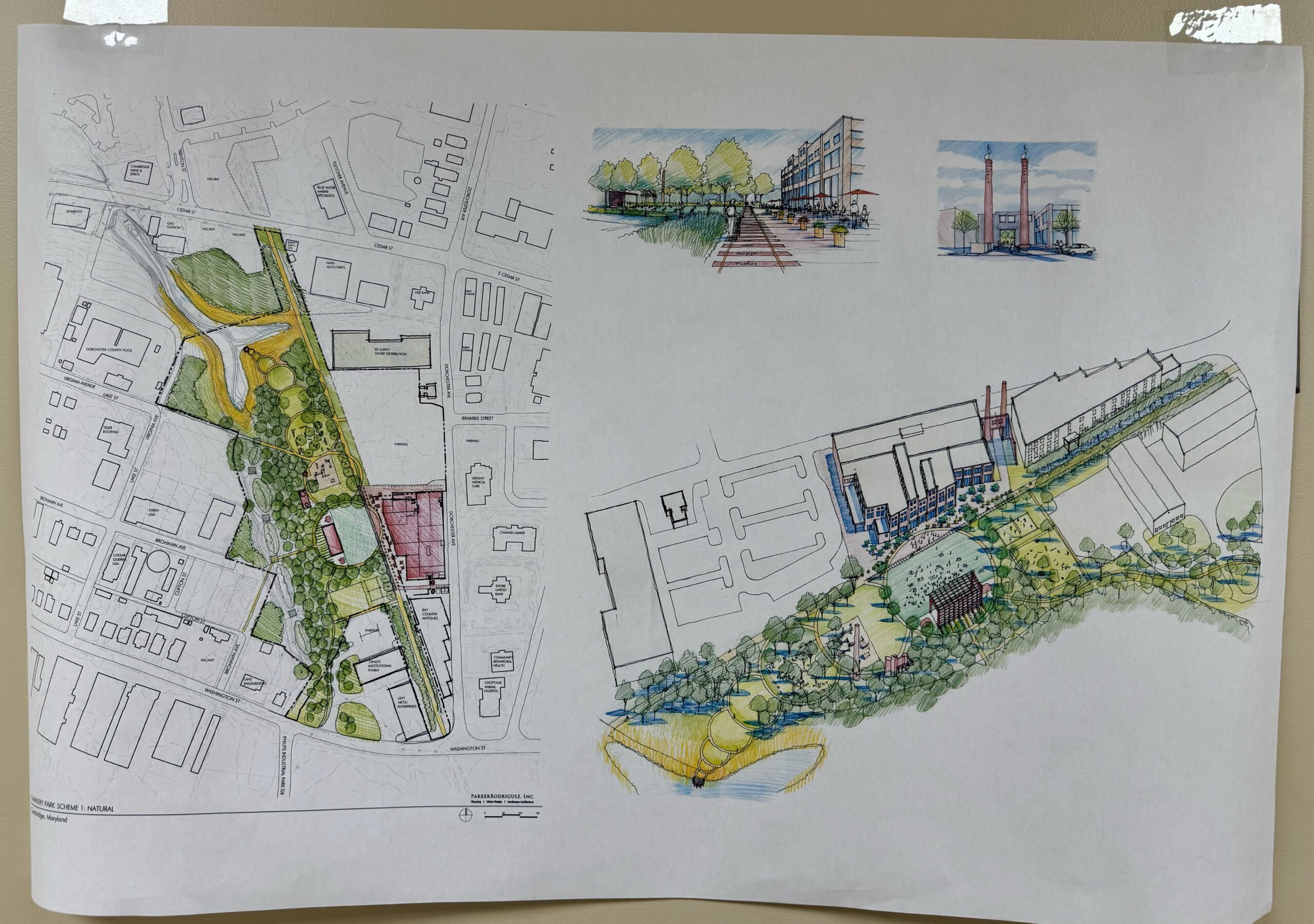
The meeting of Cambridge Association of Neighborhoods at the Dorchester County Public Library on October 22 featured three guest speakers who discussed the history of Cannery Park in Cambridge as well as plans for it and the Rails to Trails project. Opening the presentation/discussion, former City Planner Anne Roane expressed what a “very personal baby” of hers the endeavor is, and she revealed that the whole thing had begun with the idea for a skateboard park.
Two West End Mothers looking to create such a park for their children and the community had in mind to place it on the outskirts of town. But Roane got involved and sought to put the park in an urban location accessible by skateboard or on foot. She zeroed in on the six-and-a-half acres adjacent to the Phillips Packing Company building on Dorchester Avenue.
“This piece of property really spoke to me,” said Roane, “because it wasn’t being used at the time and, location-wise, it was central to town.”
While she was still City Planner, she worked with the community, the property owner, and the state to acquire the land. The Eastern Shore Land Conservancy came aboard, hoping to help get Open Space funds.
“It’s unique to find that amount of open space within a town like Cambridge,” said ESLC’s Owen Bailey. “Like, you don’t just find that type of space. So, when you have, people are tempted. ‘Oh, let’s just develop it into housing.’ It has a lot of value as open space, as community space, as a shared space for a town, and it adds so much more value to the health of the community.”
Connected to this land were old, abandoned railroad trails that everyone involved in the park project knew would benefit the community, as well.
“I had previously walked the rail trail when I first moved back to town and just got so excited about it,” explained City Commissioner Brian Roche, “and it was neat to see Anne so excited about it.”
Roche formed a nonprofit and presented the project to city and county officials, who wrote letters of support. When a leasing official for the Maryland Department of Transportation put together a draft lease for the idle piece of rail bed, the team was ready to sign a lease. But the property around it was owned by Easton Contractor Norris Taylor.

The land finally became available upon Taylor’s death, allowing for a stream restoration funded by the city. This was important because a sewer pipe had been leaking into the creek’s headwaters. In the meantime, the community got involved and started planning for development of the land.
“And, as we’re helping the town decide what we’re going to do with it,” said Bailey, “we also turned our attention to the packing house next door, and that sort of took center stage for a while.”
Katie Parks, who at the time was with Preservation Maryland, was a big advocate for the project and introduced them to a federal funding program for redevelopment. But they acquired other money to actually get started.
“Somehow, some way, they did a private fundraiser for the smokestacks,” said Roche, “which sort of made that area iconic. It’s like, ‘Here we are.’ It’s like a billboard.”
Bailey and ESLC took the lead on preserving the packing house. “Thankfully, that’s been developed. It’s a beautiful, revitalized building.”
Once tenants started moving in, the team was able to turn its focus back to the park. As Roche put it, “Because, in order for the building to succeed, the park needs to succeed.”
They brought in a Regional Urban Design Assistance Team made up of architects, urban planners, and historians who did an intensive study of the city and returned with a plan. An emphasis was placed on the Rails to Trails project. With the state’s help, Cambridge hopes to bank all the idle rail out to Hurlock, but in the near term they’ll get out to Woods Road. Dorchester County Economic Development Director Susan Banks was able to earmark money toward that end.
For the past two and a half years, ESLC have been trying to generate interest in and advocacy for trails on the Eastern Shore, because there are so few here compared to the rest of Maryland. Bailey says such trails would provide safe access to local services as well as economic and environmental benefits. Providing that for Cambridge was the main reason Roane wanted to have the discussion with CAN.
“It’s a support system that I’m looking to help create or be a part of,” she explained. “It’s forming a nonprofit to help really take ownership from a community standpoint of this really important piece of property.”
Anyone interested in becoming a Friend of Cannery Park can contact Anne Roane at [email protected] or 443-477-2571.


Write a Letter to the Editor on this Article
We encourage readers to offer their point of view on this article by submitting the following form. Editing is sometimes necessary and is done at the discretion of the editorial staff.